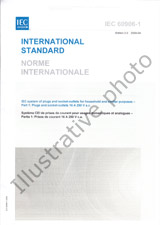We need your consent to use the individual data so that you can see information about your interests, among other things. Click "OK" to give your consent.

IEC 60068-2-58-ed.4.1+Amd.1-CSV
Environmental testing - Part 2-58: Tests - Test Td: Test methods for solderability, resistance to dissolution of metallization and to soldering heat of surface mounting devices (SMD)
Translate name
STANDARD published on 28.7.2017
The information about the standard:
Designation standards: IEC 60068-2-58-ed.4.1+Amd.1-CSV
Publication date standards: 28.7.2017
SKU: NS-1092353
The number of pages: 73
Approximate weight : 219 g (0.48 lbs)
Country: International technical standard
Category: Technical standards IEC
The category - similar standards:
Annotation of standard text IEC 60068-2-58-ed.4.1+Amd.1-CSV :
IEC 60068-2-58:2015+A1:2017 outlines test Td, applicable to surface mounting devices (SMD). This standard provides procedures for determining the solderability and resistance to soldering heat of devices in applications using solder alloys, which are eutectic or near eutectic tin lead (Pb), or lead-free alloys. The procedures use either a solder bath or reflow method and are applicable only to specimens or products designed to withstand short term immersion in molten solder or limited exposure to reflow systems. The solder bath method is applicable to SMDs designed for flow soldering and SMDs designed for reflow soldering when the solder bath (dipping) method is appropriate. The reflow method is applicable to the SMD designed for reflow soldering, to determine the suitability of SMDs for reflow soldering and when the solder bath (dipping) method is not appropriate. This edition includes the following significant technical changes with respect to the previous edition: - the addition of Sn-Bi low temperature solder alloy; - the addition of several reflow test conditions in Table 7 - Resistance to soldering heat - Test conditions and severity, reflow method; - introduction of reflow test method for Test Td3: Dewetting and resistance to dissolution of metallization; - implementation of guidance for the choice of a test severity in Clause B.3. This consolidated version consists of the fourth edition (2015) and its amendment 1 (2017). Therefore, no need to order amendment in addition to this publication. IEC 60068-2-58:2015+AMD1:2017 outlines test Td, applicable to surface mounting devices (SMD). This standard provides procedures for determining the solderability and resistance to soldering heat of devices in applications using solder alloys, which are eutectic or near eutectic tin lead (Pb), or lead-free alloys. The procedures use either a solder bath or reflow method and are applicable only to specimens or products designed to withstand short term immersion in molten solder or limited exposure to reflow systems. The solder bath method is applicable to SMDs designed for flow soldering and SMDs designed for reflow soldering when the solder bath (dipping) method is appropriate. The reflow method is applicable to the SMD designed for reflow soldering, to determine the suitability of SMDs for reflow soldering and when the solder bath (dipping) method is not appropriate. This edition includes the following significant technical changes with respect to the previous edition: - the addition of Sn-Bi low temperature solder alloy; - the addition of several reflow test conditions in Table 7 - Resistance to soldering heat - Test conditions and severity, reflow method; - introduction of reflow test method for Test Td3: Dewetting and resistance to dissolution of metallization; - implementation of guidance for the choice of a test severity in Clause B.3.
We recommend:
Updating of laws
Do you want to be sure about the validity of used regulations?
We offer you a solution so that you could use valid and updated legislative regulations.
Would you like to get more information? Look at this page.



 Cookies
Cookies
